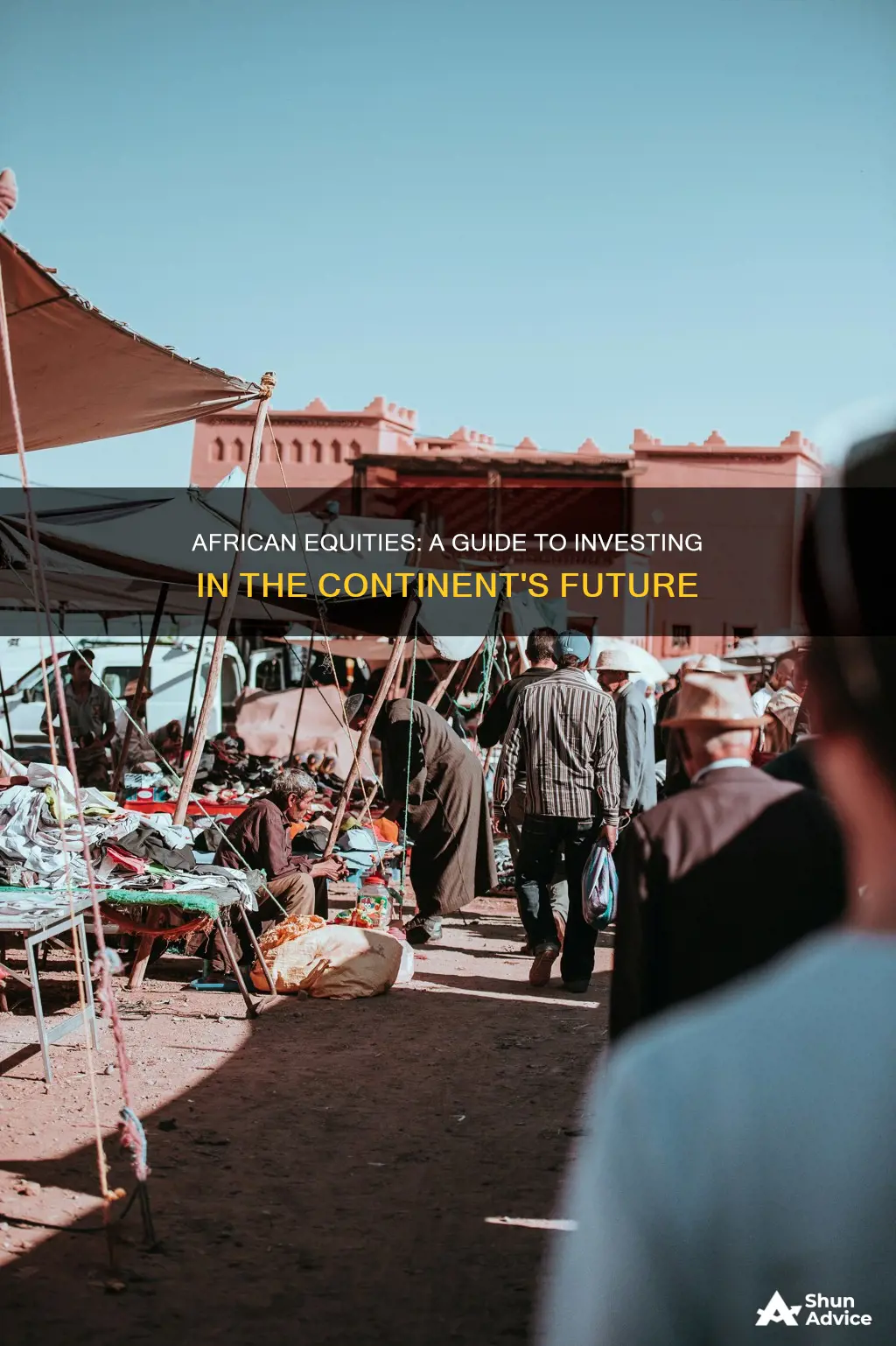
Africa is rapidly becoming one of the most attractive destinations for investors looking to diversify their portfolios into emerging markets. The continent boasts vast natural resources, a young and educated workforce, and greater stability in governance.
There are several ways to invest in African equities, including through mutual funds, exchange-traded funds (ETFs), or American depositary receipts (ADRs). Investing in African stocks directly via domestic brokerages is also an option, although it may involve additional risks and paperwork.
When considering investing in African equities, it is important to conduct thorough due diligence, as the continent still presents a riskier prospect compared to more developed regions.
| Characteristics | Values |
|---|---|
| Investment opportunities | Natural resources, consumer markets, business environments, renewable energy, technology, infrastructure |
| Countries with robust economies and favorable investment climates | Nigeria, South Africa, Kenya |
| Popular sectors for investment | Mining, oil and gas, real estate, technology, infrastructure |
| Number of stock exchanges in Africa | 19 |
| Number of ETFs available | 2 |
| Total expense ratio (TER) of ETFs tracking stocks from Africa | 0.65% p.a. - 0.85% p.a. |
| Number of ETFs tracking stocks from the most important African capital market, South Africa | >2 |
What You'll Learn

Investing in African stocks directly
When choosing a brokerage firm, there are several factors to consider. Larger brokerage firms may offer more trading liquidity, but the level of service received may be lower compared to more bespoke firms. It is also crucial to assess the country and the specific stock exchange where the investment will be made. Africa has 19 different stock exchanges, and each country and exchange may have unique characteristics in terms of trading volume, size, and regulations.
Additionally, investing directly in African stocks comes with certain risks. These include additional risks due to less stringent regulations and reporting requirements for foreign companies, unexpected taxes for U.S. investors, and exposure to foreign currency fluctuations.
For investors considering this option, the African Securities Exchanges Association (ASEA) is a valuable resource. ASEA's website provides information on which African countries have stock exchanges, allowing investors to research and select the specific stockbrokers they want to work with.
While investing directly in African stocks may offer more control and potentially higher returns, it is important to carefully weigh the risks and conduct thorough research before committing.
Investing Audiobook: A Guide for Indians
You may want to see also

Investing in African real estate
Real estate is a growing sector in Africa, with increasing demand for both residential and commercial properties. The continent's rapid population growth and technological and industrial development are expected to drive future increases in demand for real estate, especially in cities geared towards these sectors.
Where to Invest in African Real Estate
When considering where to invest in African real estate, it is essential to look for cities and countries with robust economies, favourable investment climates, and high potential for growth. Here are some factors to consider:
- Economic Strength and Stability: Look for countries with strong and stable economies, such as Nigeria, South Africa, and Kenya, which have favourable investment climates.
- Technological and Industrial Development: Focus on cities that are geared towards technological and industrial development, as these areas are expected to experience higher demand for real estate.
- Population Growth: Consider areas with a growing population, as this will drive the demand for housing and commercial spaces.
- Infrastructure Development: Invest in regions with ongoing or planned infrastructure development projects, such as transportation, power, and water projects, as these will support economic growth and increase the value of surrounding real estate.
- Regulatory Environment: Stay informed about regulatory changes and choose countries with stable and favourable investment policies.
- Local Partnerships: Leverage local partnerships and seek advice from experienced investors who understand the local market and can guide you towards sustainable, long-term investments.
How to Invest in African Real Estate
There are several ways to invest in African real estate:
- Real Estate Investment Trusts (REITs) : The simplest way to invest in African real estate is through REITs. These pooled funds operate like mutual funds for the real estate market. They accumulate a portfolio of income-generating rental properties and distribute any net proceeds to investors.
- Direct Property Investment: You can also consider investing directly in African real estate by purchasing residential or commercial properties. This option may offer higher returns but comes with additional risks and requires a more hands-on approach to management.
- Real Estate Funds: Another option is to invest in African real estate funds, which are managed by professional fund managers who identify the best investment opportunities across the continent. However, these funds have struggled to raise as much capital as private equity and infrastructure vehicles in the region.
- Exchange-Traded Funds (ETFs) : ETFs are a popular investment vehicle in developed countries, but they may not be the best option for investing in African real estate due to the complexity of purchasing shares on multiple African stock exchanges and the potential impact of currency fluctuations.
- Stockbroker Accounts: You can open a stockbroking account with leading brokers in African countries and seek their recommendations for real estate investments. However, be sure to conduct thorough due diligence on the brokerage firm.
Risks and Considerations
While investing in African real estate offers significant potential, it is essential to be aware of the risks and considerations:
- Risk Profile: Africa is generally considered a riskier prospect for investors than more developed regions, so it is essential to approach investments with caution and conduct thorough due diligence.
- Political and Economic Stability: Although governance stability has improved in many African countries, it is essential to monitor political and economic stability to mitigate potential risks.
- Currency Fluctuations: Currency fluctuations can impact the value of your investments, especially when investing through ETFs or stockbroker accounts.
- Additional Costs and Risks: Investing in African real estate may entail higher costs and risks, including those associated with cross-border transactions and local regulations.
- Liquidity: African real estate investments may have lower liquidity than those in more developed markets, making it more challenging to exit your investments quickly if needed.
Final Thoughts
Assessing Chase You Invest: Portfolio Performance Indicators
You may want to see also

Investing in African companies through ETFs
ETFs, or exchange-traded funds, are a great way to invest in African companies, especially for new investors. They are traded on US exchanges and provide the built-in advantages of ease, diversification, and professional management.
How to Invest in African Companies through ETFs
There are a few ways to invest in African companies through ETFs. Firstly, you can purchase a broad-market index ETF that invests in a wide range of African companies. This option provides low-cost exposure to the entire African stock market. Currently, there are only two ETFs available that broadly diversify investments in African stocks: the Amundi Pan Africa UCITS ETF AccLU1287022708 and the Xtrackers MSCI EFM Africa Top 50 Capped Swap UCITS ETF 1CLU0592217524. These ETFs track either the MSCI Emerging and Frontier (EFM) Africa Top 50 Capped index or the SGI Pan Africa index, which focus on large stocks listed in Africa or those exploring African assets.
Alternatively, you can purchase an African country-specific ETF, such as the iShares MSCI Nigeria Investable Market Index ETF (NGE), which provides exposure to over 100 companies across 10 sectors in Nigeria, or the iShares MSCI Ghana Index Fund ETF (GFA), which focuses on large, established companies in Ghana.
Another option is to invest in a sector-specific ETF that targets a particular industry within Africa. For example, the iShares MSCIT Ghana Mining ETF (GEMG) provides exposure to the mining industry in Ghana.
Finally, you can consider a currency-hedged ETF, such as the Vanguard FTSE Africa Hedged Index Fund ETF (VFA), which helps to mitigate the risk of currency fluctuations by keeping a percentage of its assets in cash.
Advantages of Investing in African Companies through ETFs
Secondly, ETFs are traded on US exchanges, making them easily accessible to US investors. They are also simple to invest in, requiring only a digital account and a broker to buy and sell. Additionally, ETFs are professionally managed, so you can benefit from the expertise of experienced fund managers.
Considerations when Investing in African Companies through ETFs
While investing in African companies through ETFs has its advantages, there are a few considerations to keep in mind. The range of Africa-focused ETFs is currently limited due to less developed capital markets and political risks in many African countries. As a result, some ETFs may have higher expense ratios compared to other investment options.
Additionally, investing in African companies carries a higher level of risk compared to more developed regions due to the continent's historical unrest and less stable governance. Therefore, it is important to conduct thorough due diligence and approach these investments with caution.
Examples of African ETFs
Some prominent African ETFs include:
- VanEck Africa Index ETF (AFK): Tracks some of the largest and most liquid stocks in Africa, with a focus on South Africa, Morocco, and Canada.
- IShares South Africa Index Fund (EZA): Invests primarily in mid-sized and large companies in South Africa, particularly in the financial, materials, and consumer discretionary sectors.
- VanEck Egypt Index ETF (EGPT): Provides access to Egypt, the third-largest economy in Africa.
Valuing Investment Management Firms: Strategies for Success
You may want to see also

Investing in African companies through mutual funds
Advantages of Investing in African Companies Through Mutual Funds
- Diversification: Mutual funds allow you to invest in a large basket of different securities, providing diversification across various industries and regions within Africa. This helps to mitigate risks and capitalize on the continent's vast potential.
- Ease and Professional Management: Mutual funds are traded on US exchanges, making it easier for investors to access and manage their investments. These funds are professionally managed, so you can benefit from the expertise of experienced fund managers.
- Long-term Capital Appreciation: The primary investment objective of most Africa-focused mutual funds is to provide long-term capital appreciation. This means your investment has the potential to grow over time, especially with the continent's economic growth and development.
- Access to Emerging Markets: Africa is home to some of the world's fastest-growing economies, and mutual funds provide a straightforward way to access these emerging markets. You can invest in companies across different sectors, including financial products, healthcare, transportation, tourism, and manufacturing.
Popular Africa-Focused Mutual Funds
- Commonwealth Africa Fund (CAFRX): Launched in 2011, CAFRX is one of five mutual funds under the Commonwealth International Series Trust. It invests primarily in equity and debt securities issued by African companies in the manufacturing and mining sectors.
- T. Rowe Price Africa and Middle East Fund (TRAMX): TRAMX focuses on banks and companies in Africa and the Middle East, with over 25% of its portfolio located in South Africa. This fund provides exposure to both regions.
- Nile Pan Africa Fund (NAFAX): According to Frontier Africa Reports, the Nile Pan Africa Fund offers significant exposure to frontier markets in Africa, making it an attractive choice for investors specifically interested in these markets.
Factors to Consider
When investing in African companies through mutual funds, it is essential to keep the following in mind:
- Risk and Due Diligence: Africa is considered a riskier prospect for investors than more developed regions. Conduct thorough due diligence before investing, and be sure to understand the risks involved, including market, foreign security, and geographic risks.
- Currency Risk: Currency fluctuations can impact your investment returns. Be aware of the potential impact of currency depreciation on your investments.
- Country and Sector Allocation: Different mutual funds have varying country and sector allocations. Ensure you understand where your money is being invested and align your investments with your interests and goals.
- Performance and Fees: Review the historical performance of the mutual fund to get an idea of potential returns. Also, consider the fees and expenses associated with the fund to ensure they are reasonable and won't eat into your profits.
In conclusion, investing in African companies through mutual funds offers a strategic way to gain exposure to the continent's emerging markets. By diversifying your portfolio, conducting thorough research, and carefully selecting reputable mutual funds, you can potentially benefit from Africa's economic growth and capitalize on its vast investment opportunities.
Opening an Investment Firm in India: A Comprehensive Guide
You may want to see also

Investing in African companies through American depositary receipts (ADRs)
American Depositary Receipts (ADRs) are a great way for investors in the United States to trade select stocks of African companies. ADRs are negotiable certificates issued by a U.S. depositary bank representing a specified number of shares—usually one share—of a foreign company's stock. The ADR trades on U.S. stock markets as any domestic shares would.
ADRs offer U.S. investors a way to purchase stock in overseas companies that would not otherwise be available. Foreign firms also benefit from ADRs as they enable them to attract American investors and capital without the hassle and expense of listing on U.S. stock exchanges.
ADRs are denominated in U.S. dollars and are easy to track and trade. They are available through U.S. brokers, and they offer portfolio diversification. However, investors may face double taxation and currency conversion fees.
There are two basic categories of ADRs: sponsored and unsponsored. A bank issues a sponsored ADR on behalf of the foreign company, with the two parties entering into a legal arrangement. The foreign company usually pays the costs of issuing an ADR and retains control, while the bank handles the transactions with investors. Sponsored ADRs are categorised by the degree to which the foreign company complies with Securities and Exchange Commission (SEC) regulations and American accounting procedures.
Unsponsored ADRs, on the other hand, are issued by a bank without the involvement, participation, or even permission of the foreign company. In theory, multiple unsponsored ADRs for the same foreign company could be issued by different U.S. banks, and these may offer varying dividends. With sponsored programs, only one ADR is issued by the bank working with the foreign company.
ADRs are also categorised into three levels, depending on the extent to which the foreign company has accessed the U.S. markets. Level I ADRs are only found on the over-the-counter market and have the loosest requirements from the SEC. Level II ADRs can be used to establish a trading presence on a stock exchange but cannot be used to raise capital. Level III ADRs are the most prestigious, allowing issuers to float a public offering of ADRs on a U.S. exchange and raise capital.
Some well-known companies that offer ADRs include Nokia, Shell, and Unilever.
H1B Visa Holder? Smart Investment Strategies for Your Savings
You may want to see also
Frequently asked questions
The easiest way to invest in the whole African stock market is to invest in a broad market index using ETFs. ETFs on the most important African capital market, South Africa, can be used as an alternative to ETFs covering the whole continent.
Africa is a riskier prospect for investors than more developed regions due to less developed capital markets and political risks in many African countries. However, Africa is rapidly becoming one of the newest destinations for emerging markets investors. The continent has extensive natural resources, a young and increasingly educated workforce, more stability in governance, and more prospects for economic growth than in previous years.
Some popular sectors for investment include mining, oil and gas, real estate, technology, and infrastructure.







